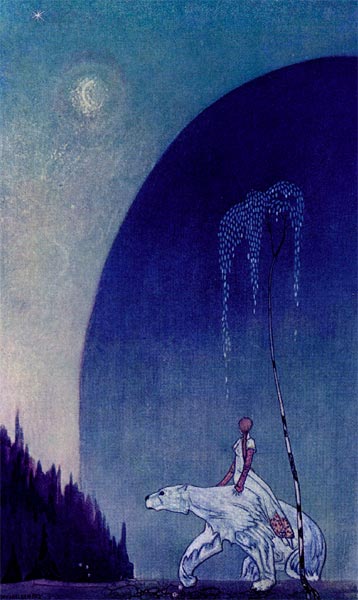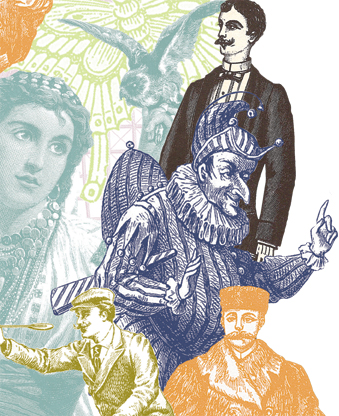"Croup and Vandemar, the Old Firm. Nuisances eliminated, obstacles obliterated, bothersome limbs removed, and tutelary dentistry."
I have struggled with writing about Croup and Vandemar, so I have put it off. They are so specific and at the same time deeply ambiguous. It was delightful to hear our actors Croup and Vandemar at the first read through of the script and I suspect it is a delight for the actors who play them to have the comedic payoff of the Croup's circumlocutions followed by Vandemar's bluntness. Yet, I find the idea of the characters (not the actors) deeply disturbing.
First, to focus on the names. Gaiman has said that Croup and Vandemar are what they call themselves and no one would dare call them anything else. The word croup in the Oxford English Dictionary is defined as the hindquarters of a horse or other beast of burden and also as a disease fatal to children of inflammation to the larynx and cough, or the short form of a croupier or card shuffler. None of which is inappropriate for Croup but none of which captures his menacing loquacity.

Vandemar, is a Dutch name van meaning of de the. I did not find any specific Dutch translation for Mar as either a region or of the sea. However, on its own to mar can mean to hamper, hinder, damage or impair which sounds about like one of Croup's lists of their favorite activities.
There is a history of appealing villains. Iago in
Othello, Edmund in
King Lear, Count Fosco in
The Woman in White. But none of them compare to the menace of the pair of Croup and Vandemar and I think that is because they are all at least human. Croup and Vandemar are not human. They move with great speed and apparent ease, when Croup asks, quoting
The Merchant of Venice, "If you prick us do we not bleed." Vandemar answers, "No" Vandemar puts a knife through his hand without feeling any apparent pain or bleeding. When Richard calls them men, Door scoffs then says, "I suppose you could call them men." She then refines her definition of their being men as has having two arms, two legs and a head a piece.
Part of what makes Croup and Vandemar so uncomfortable, so uncanny, is the fact that they have the appearance of the human but are, in fact something other that seeks only destruction. Sigmund Freud has an essay on
The Uncanny (which is very accessible - it is as much literary criticism as psychoanalysis) in which he talks about E.T.A. Hoffman's fairy tales and the uncanny. He specifically addresses the idea of the double first in the idea of the body and soul which allows one to think about the immortality of some part of the self in response to fears about mortality but then mentions that its reverse can be seen as a harbinger of death. In
Neverwhere, Croup and Vandemar are uncanny because they represent a double or a doppleganger. They have the appearance of men but are not human. These apparently immortal humanlike creatures bring death with them. An outraged Croup lists their credentials to their mysterious employer as having assassinated, kings, popes, heroes and reputed gods as well as starting a plague. Their uncanniness is heightened by their powers seeming to be magical and beyond human. Not only do they bring death but also the can not be stopped by normal human means.
They are disturbing precisely because they seem human and are not and because their power to harm or bring death seems unstoppable. They are also disturbing in the way they function as a pair. They seem almost to know each other's thoughts. At the beginning of the novel Gaiman gives us a long description of how we can tell Croup and Vandemar apart and then tells us they look nothing like each other. Yet that description is necessary because the two beings function together. When Door has opened the door at the end of the novel Vandemar shrugs when he sees Croup sucked in without out him and then lets go to join his partner. The two of them seem to need to be together to function. Oh and for all the Gaiman fans, if you decide to read the Freud there is an interesting discussion of Hoffman's Sand-man.
I also wanted to mention something that has always struck me about Croup and Vandemar's crucifixion of the Marquis. As it is described, the Marquis is not on a cross but on a circle. His arms and legs are out in a gruesome parody of Leonardo daVinci's drawing "The Vitruvian Man" above. It always struck me that this is the height of what Croup and Vandemar stand for. It is not just the loss of life (which would be enough to horrify) but the destruction of beauty, thought, art, every good humanist ideal that we could associate with Leonardo daVinci's renaissance world. It is why Croup's eating a one of a kind piece of T'ang Dynasty pottery fits with the destruction of human life. It is not just an erasing of life but of all human potential and capacity for goodness and beauty.
Perhaps most disturbing of all is their ability to as it is put in
Hamlet, "That one may smile, and smile, and be a villain."Although perhaps that refers to Islington since Croup's smile is described as ghastly.














